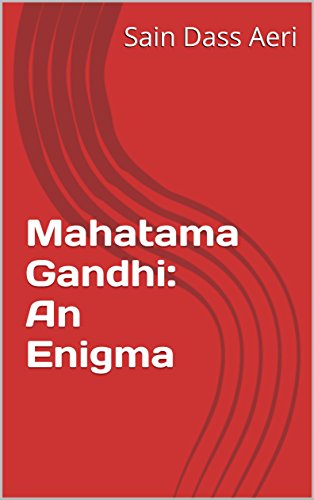 Mahatma Gandhi: An Enigma Mahatma Gandhi: An Enigma
Though Gandhi is one of the most unfragmented, steady and consistent historical figures, yet, what he said and what he did had a perception of contradictions and ambiguities. And that made him an enigma. |
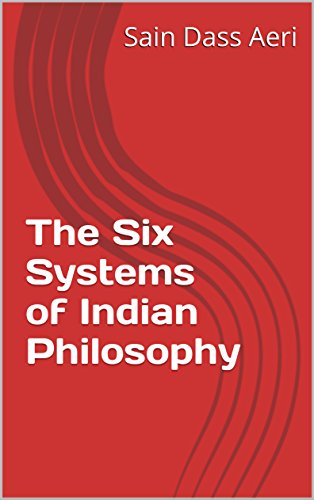 The Six Systems of Indian Philosophy (Kindle Edition) The Six Systems of Indian Philosophy (Kindle Edition)
This book is primarily addressed to those who are interested in understanding Indian philosophy in a layman’s language. This book will also appeal to those people of East Indian origin who have adopted the “West” as their permanent home and living in the Western milieu of rationalistic enquiry find it difficult to ‘relate’ to the Indian religious culture; though, at the same time, they do carry, hidden in their chests, an insatiable curiosity to acquire familiarity with the philosophical roots of their Indian religion. This book will definitely answer some of their questions while raising still many more, which actually is the intention of the author. Knowledge should stay as an on-going process; otherwise, it is likely to become a dead-end ritual. So, grab an easy chair and a cup of coffee and let us get into the atmosphere of Indian philosophy that has prevailed for more than twenty centuries, the atmosphere that still colors the everyday religious life of all Indians, of all ages and of all colors, wherever they happen to be in this world. |
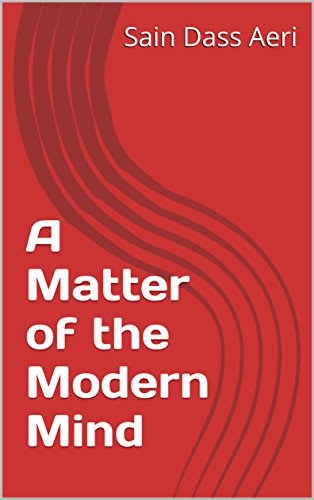 A Matter of the Modern Mind (Kindle Edition) A Matter of the Modern Mind (Kindle Edition)
Ours is a mind-ridden, “me- obsessed” age that is running endlessly and constantly after possessions and achievements and is moving at a very fast pace forgetting Gandhi’s words, “there is more to life than speed”. Inevitably, we are landing ourselves, more and more, into moral dilemmas and moments of indecisions that cause tremendous stress and anguish; forgetting the fact that a prolonged state of indecision can cause nervous breakdown. This book is based on a two-pronged premise; one that the solution to all our problems is the understanding of our own minds; and second that we need to formulate, on our own, a meaning and a purpose of our existence on this earth. |
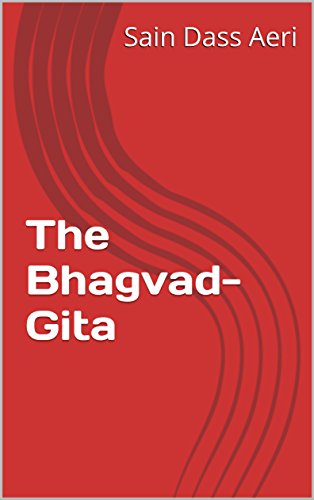 The Bhagvad-Gita (Kindle Edition) The Bhagvad-Gita (Kindle Edition)
The importance of the Bhagavad-Gita, popularly known simply as the Gita, is universal and eternal. The central message of the Gita has never changed, though different milieus have given more importance to one aspect of this message than to the others. What is it in the Gita that appeals to the modern reader? It is the psycho-philosophical analysis of an indecisive mind in the Gita that has relevance to our modern man who is basically agnostic, and is indifferent to any ready-made, moral and religious prescriptions.
The Gita goes so deep into the abysses of mind that there is nothing else beyond except a spiritual world. The Gita demonstrates to us that the mental and spiritual are two sides of the same coin; one is a mirror of our stresses and dilemmas in life and the other is a reference point, a tool to resolve these issues. We have to read into Lord Krishna’s words, carefully and profoundly if we want to make the best out of Bhagavad-Gita; otherwise, it will carry only a ritualistic importance in our lives.
This book falls into three sections. The first one looks at Arjuna’s dilemma in the context of what, these days, is known as Depth psychology, in a layman’s language, rather than in an academic approach ; the second part looks at the Gita’s perennial recommendations to resolve our moral issues and stresses in life; and the third section looks at the metaphysical assumptions behind these recommendations. |
 A Matter of The Modern Mind: Being The reflections of a layman A Matter of The Modern Mind: Being The reflections of a layman
The race for possessions and the subsequent attachments have blinded the modern man in overlooking an important fact of life; “do we really need to toil that much to maintain that which needs so little?” We cannot alleviate our stresses in life until and unless we have come to formulate, for ourselves, on our own, a meaning of our existence on earth. All other remedies for stress, from Prozac to Yogic meditation, from physical exercises to mindfulness, are nothing more than short-lived, temporary solutions. The principle subject that we are concerned with in this book is the importance of formulating a personal meaning of life. Why are we here on this earth? This book does not provide any answers; though it might suggest some; but it does stress the importance of seeking the answers on our own. If there is one thought that we should constantly ponder over is , could it be that , ” our individual will is nothing but a self-woven veil over the Cosmic Will”. |
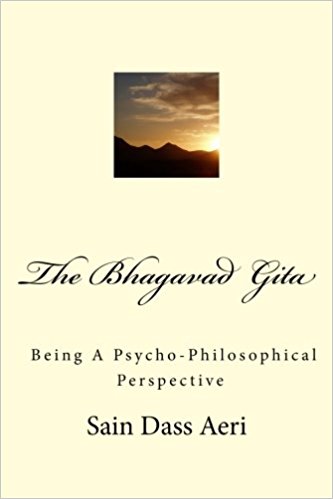 The Bhagavad-Gita: Being a Psycho-Philosophical Analysis of an Indecisive Mind The Bhagavad-Gita: Being a Psycho-Philosophical Analysis of an Indecisive Mind
A modern, psycho-philosphical perspective on one of the most revered scriptures of the world. This book looks at the Gita in three perspectives. The first one looks at Arjuna’s dilemma in the context of what, these days, is known as Depth psychology, (in a layman’s language, rather than in an academic approach) ; the second one looks at the Gita’s perennial recommendations to resolve our moral issues and stressful situations in life; and the third one looks at the metaphysical assumptions behind these recommendations. |
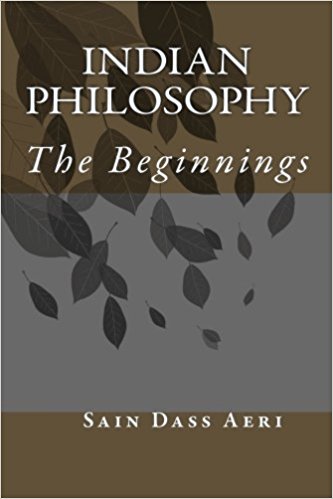 Indian Philosophy: The Beginnings Indian Philosophy: The Beginnings
For many, the expressions Indian philosophy and Indian religion are identical. And then, there is a contention which comes from the modern ideas of pragmatism ; the premise of this contention is that the study of orthodox Indian philosophy is irrelevant in this modern age of rationalism. The truth is otherwise; it is doubtful if one can find an equivalent of the ever-fresh utterances of the Vedas , the thought-provoking concepts of the Upanishads , the metaphysical doctrines of the ‘darshanas’ , the deep psychological analysis of the Buddhism , and the ethical pragmatism of the Jainism , in any other scriptures of the world. The fact is that the study of Indian philosophy demands a spiritual awakening and a certain kind of patience which is rather anachronistic in the fast, materialistic, overtly impatient, modern way of thinking. The study of old Indian philosophical thought carries rewards that are intrinsic, rather than utilitarian; besides being therapeutic for the reader. |
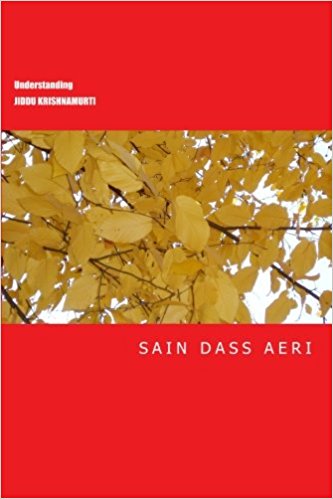 Understanding Jiddu Krishnamurti Understanding Jiddu Krishnamurti
Krishnamurti is one of those thinkers who believes that no external source, may that be an authority like a prophet or a Guru, scriptures like Bible or the Bhagavad-Gita, or an organised religion like Christianity, can impart us the ultimate knowledge of our existence. The only source is our mind and our thoughts. Secondly, only our own awakening can bring about a transformation in our lives; none, other than (we), can do it for us. He went a step further and believed that dependence on the external sources is a hindrance rather than a help in our spiritual progress. For him, God was the single most, the biggest invention and enslaver of human mind. Dr Ruben Gonzalez, in his conversations with Krishnamurti , once told him that people were angry at him for the things that he had said about God “God is disorder and if man is God, creation, God has to be horrible, a monstrous entity. God must be disorder since we live in disorder. If He made us like He is and we are killing each other, then, He must be monstrous.” (Krishnamurti, Sannen, 1980). |
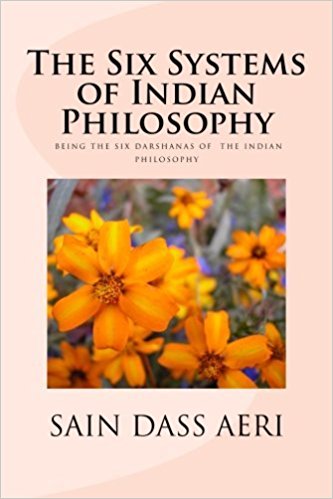 The Six Systems of Indian Philosophy: Being a layman’s Understanding of the Six Darshanas The Six Systems of Indian Philosophy: Being a layman’s Understanding of the Six Darshanas
This book is a simplified account of the six systems of Indian Philosophy , also known as the six principal Darshanas. This book is primarily addressed to those who are interested in understanding Indian philosophy in a layman’s language. Having said that, it does not mean that, at places, the reading will not become dry and tedious; after all, any philosophical endeavor carries with it such elements. This this book will also appeal to those people of East Indian origin who have adopted the “West” as their permanent home and living in the Western milieu of rationalistic enquiry find it difficult to ‘relate’ to the Indian religious culture; though, at the same time, they do carry, hidden in their chests, an insatiable curiosity to acquire familiarity with the philosophical roots of their Indian religion. This book will definitely answer some of their questions while raising still many more, which actually is the intention of the author. Knowledge should stay as an on-going process; otherwise, it is likely to become a dead-end ritual. So, grab an easy chair and a cup of coffee and let us get into the atmosphere of Indian philosophy that has prevailed for more than twenty centuries, the atmosphere that still colors the everyday religious life of all Indians, of all ages and of all colors, wherever they happen to be in this world. ( The author) |









